On Self-cultivation
孟子思想介绍英文PPT

desire, we must turn inwards and examine ourselves in every point. 爱人不亲,反其仁;治人不治,反其智;礼人不答,反其敬。行有不得者,皆反求
诸己。
——《孟子·离娄章句上》
There is no greater delight than to be conscious of sincerity on self-examination.
Views on Human Nature
慢下来享受生活的名人名言

慢下来享受生活的名人名言1.享受生活的名人名言1、不要心平气和,不要容你自己昏睡!趁你还年轻,强壮、灵活,要永不疲倦地做好事。
——契诃夫2、创造者才是真正的享受者。
——富尔克3、节制使快乐增加并使享受加强。
——德谟克利特4、懒人无法享受休息之乐。
——拉布克5、能忍受自己的人才能享受空闲。
——葛瑞伯6、让我们享受人生的滋味吧,如果我们感受得越多,我们就会生活得越长久。
——法朗士7、人不像动物,人能领略出生活的唯一目的就是享受生活。
——巴特勒8、人的一生只是一刹那。
所以我们要珍惜它,在世上一天就要过好一天,切莫虚度了年华。
——里克特9、人活着总是有趣的,即便是烦恼也是有趣的。
——亨利·门肯10、人生就像一本书,傻瓜们走马观花似地随手翻阅它,聪明的人用心地阅读它。
因为他知道这本书只能读一次。
——保罗11、人生虽只有几十春秋,但它决不是梦一般的幻灭,而是有着无穷可歌可颂的深长意义的;附和真理,生命便会得到永生。
——泰戈尔12、人生最大快乐,是自己的劳动得到了成果。
农民劳动得了收获、工人劳动出了产品、医生劳动治好了病、教师劳动教好了学生,其他工作都是一样。
——谢觉哉13、生命的目的是享受生命。
——维斯冠14、生命苦短,便这既不能阻止我们享受生活的乐趣,也不会使我们因其充满艰辛而庆幸其短暂。
——沃维纳格15、我爱人生,所以我愿像一个狂信者那样投身到生命的海里。
——巴金16、我始终不愿抛弃我的奋斗生活,我极端重视奋斗得来的经验,尤其是战胜困难后所得到的愉快,一个人要先经过困难,然后踏进顺境,才觉得受用、舒适。
——爱迪生17、我相信,现在未能把握的生命是没有把握的;现在未能享受的生命是无以享受的;而现在未能明智地度过的生命是难以过得明智的;因为过去的已过去,而无人得知未来。
——葛雷。
2.关于享受人生名人名言1、采菊东篱下,悠然见南山。
山气日夕佳,飞鸟相与还。
——出自魏晋陶渊明的《饮酒·其五》译文:在东篱之下采摘菊花,悠然间,那远处的南山映入眼帘。
《古人谈读书》文言文原文注释翻译

《古人谈读书》文言文原文注释翻译古人谈读书读书在古代被视为一种重要的修养方式,被广泛推崇和讨论。
许多古人对于读书的重要性、读书的方法以及读书的效益都有自己的见解和体会。
本文将为大家带来一些古人关于读书的观点,以文言文原文为主,并附有注释和翻译。
一、鲁迅:读书必须静心鲁迅先生是中国现代文化史上的巨擘,他在《伤逝》一文中提到:“非力事之修习,几在读书养性。
”鲁迅先生认为,读书是一种培养心性的方法,读书需要静心。
只有在宁静的环境中,才能专心致志地阅读,从而获得更多的收获。
二、王羲之:笔墨纵横,读书体会自晋代王羲之以来,书法始终被认为是读书修养的一种方式。
他在《谢才知敬真请与之言类》中说:“古者无聊,采若有用之文读,调之若琴剑,必恶于今象。
”这句话意为:“古代人没有业余娱乐,以有用的文章为乐,发挥琴剑之类,不嗜好现代的世俗文艺。
”读书不仅仅是为了娱乐,更是为了获得更高的文化修养。
三、陶渊明:读书需要有所求陶渊明是东晋时期著名的文学家和政治家,他在《归去来兮辞》中提到:“爱彼远求之士,怀抱苦思翁。
”陶渊明认为,读书者应该具备远大的心愿和追求,怀抱着苦思之人的心态来读书。
只有足够的渴望和毅力,才能在求知的道路上取得更大的成就。
四、司马迁:读书坚持至死司马迁是汉代著名的史学家,《史记》的作者。
他在《报任安书》中说:“舍细病,志不能忘也。
”这句话的意思是:“舍弃一些小的健康问题,因为我的心志和追求不能忘记。
”司马迁认为,读书是一种持续的修养过程,不管遇到什么困难和障碍,都应该坚持不懈地读下去。
五、杜甫:读书为了修身养性杜甫是唐代著名的诗人,在《江畔独步寻花·其五》中写道:“花别庭院空纷漫,人间富贵多荣宠。
知君不肯故园别,留取吾初心。
”杜甫认为,读书的目的是为了培养人的品格和修养,不受外界的干扰和诱惑,始终保持读书初心。
以上是一些古人关于读书的观点和见解。
通过这些观点,我们可以得出一个共同的结论:读书不仅仅是为了获取知识,更是为了个人的修养和提升。
描写青春的英文词语
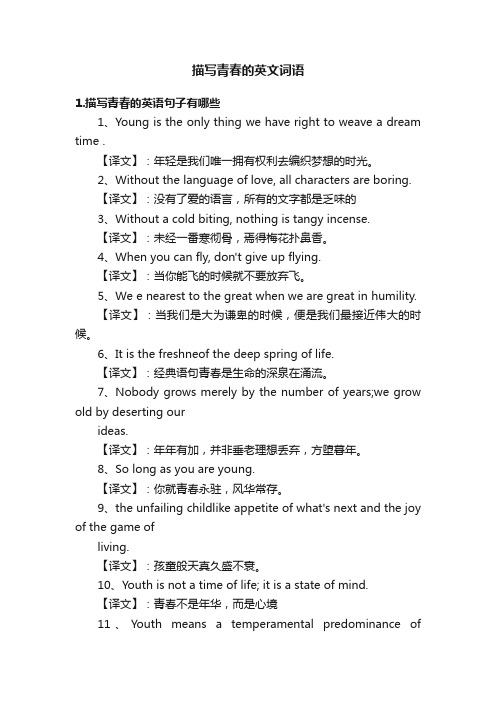
描写青春的英文词语1.描写青春的英语句子有哪些1、Young is the only thing we have right to weave a dream time .【译文】:年轻是我们唯一拥有权利去编织梦想的时光。
2、Without the language of love, all characters are boring.【译文】:没有了爱的语言,所有的文字都是乏味的3、Without a cold biting, nothing is tangy incense.【译文】:未经一番寒彻骨,焉得梅花扑鼻香。
4、When you can fly, don't give up flying.【译文】:当你能飞的时候就不要放弃飞。
5、We e nearest to the great when we are great in humility.【译文】:当我们是大为谦卑的时候,便是我们最接近伟大的时候。
6、It is the freshneof the deep spring of life.【译文】:经典语句青春是生命的深泉在涌流。
7、Nobody grows merely by the number of years;we grow old by deserting ourideas.【译文】:年年有加,并非垂老理想丢弃,方堕暮年。
8、So long as you are young.【译文】:你就青春永驻,风华常存。
9、the unfailing childlike appetite of what's next and the joy of the game ofliving.【译文】:孩童般天真久盛不衰。
10、Youth is not a time of life; it is a state of mind.【译文】:青春不是年华,而是心境11、Youth means a temperamental predominance ofcourage over timidity.【译文】:青春气贯长虹,勇锐盖过怯弱12、Youth first classics never redeemed.【译文】:青春一经典当即永不再赎。
先秦诸子经典对国家社会和自己的影响作文

先秦诸子经典对国家社会和自己的影响作文The classical works of the Pre-Qin philosophers, also known as the "Pre-Qin Masters" or "Pre-Qin Confucianism," have had a profound influence on Chinese society and the individuals themselves.先秦诸子的经典著作,也被称为“先秦诸子”或“先秦儒家”,对中国社会和个人自身产生了深远的影响。
Firstly, the thoughts and philosophies of these ancient scholars have greatly impacted the governance and administration of the state. Their ideas on governance, justice, and the moral conduct of rulers have laid the groundwork for moral and ethical standards in governance.首先,这些古代学者的思想和哲学观念对国家的治理和行政产生了深远的影响。
他们关于治理、正义和统治者道德行为的观念,为治理中的道德和伦理标准奠定了基础。
Secondly, their teachings on personal morality and virtue have had a significant impact on the ethical standards of individuals in society. The emphasis on self-cultivation, righteousness, and filial piety hasinfluenced the moral conduct and values of Chinese people for centuries.其次,他们关于个人道德和美德的教导对社会中个人的道德标准产生了显著的影响。
修养篇SELF-CULTIVATION
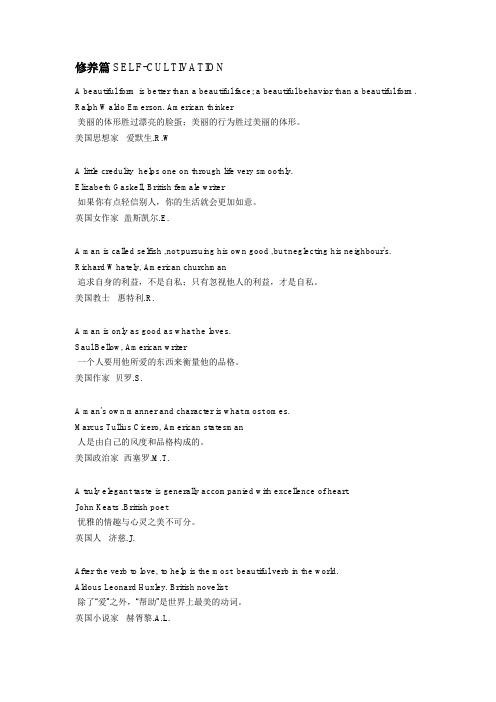
修养篇SELF-CULTIVATIONA beautiful form is better than a beautiful face; a beautiful behavior than a beautiful form. Ralph Waldo Emerson. American thinker美丽的体形胜过漂亮的脸蛋;美丽的行为胜过美丽的体形。
美国思想家爱默生.R.WA little credulity helps one on through life very smoothly.Elizabeth Gaskell, British female writer如果你有点轻信别人,你的生活就会更加如意。
英国女作家盖斯凯尔.E.A man is called selfish ,not pursuing his own good ,but neglecting his neighbour's. Richard Whately, American churchman追求自身的利益,不是自私;只有忽视他人的利益,才是自私。
美国教士惠特利.R.A man is only as good as what he loves.Saul Bellow, American writer一个人要用他所爱的东西来衡量他的品格。
美国作家贝罗.S.A man's own manner and character is what most omes.Marcus Tullius Cicero, American statesman人是由自己的风度和品格构成的。
美国政治家西塞罗.M.T.A truly elegant taste is generally accompanied with excellence of heart.John Keats .British poet优雅的情趣与心灵之美不可分。
英国人济慈.J.After the verb to love, to help is the most beautiful verb in the world.Aldous Leonard Huxley. British novelist除了“爱”之外,“帮助”是世界上最美的动词。
lecture3《大学》英译赏析
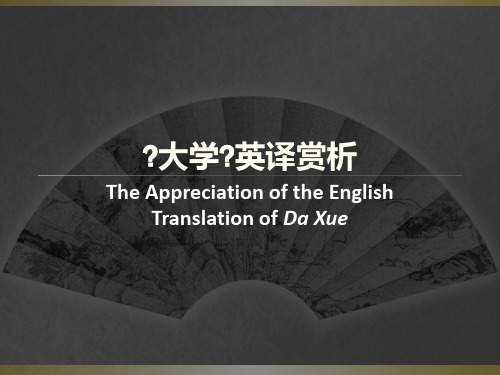
The Appreciation of the English Translation of Da Xue
背景介绍
Background Information
?大学?原为?礼记?中的一篇,相传为曾参〔前505-前432〕所撰, 为唐人韩愈、李翱所竭力推崇。宋代程颐程颢兄弟对其进展了系 统地整理和深入研究,使其初具独立成经的地位。
Psalm 94:1: “O LORD, the God who avenges, O God who avenges, shine forth.〞(耶和华啊,你是伸冤的神;伸冤的神啊,求你发出 光来!)
“小学〞VS.“大学〞
?礼记·学记?:“古之教者,家有塾,党有庠,术 有序,国有学。比年入学,中年考校。一年视离 经辨志,三年视敬业乐群,五年视博习亲师,七 年视论学取友,谓之小成。九年知类通达,强立 而不反,谓之大成。夫然后足以化民易俗,近者 说服而远者怀之,此大学之道也。〞
Only when one comes to understand this point of rest can one reach a state of unwavering stability. Having reached this unwavering state, one can then enjoy an unruffled quietude; having attained this state of quietude, one can then achieve an inner calm; once one has achieved this inner calm, one is then in a position to exercise one’s capacity to deliberate clearly. And it is the capacity of deliberation that provide the basis for all moral attainment.
大学生如何塑造美的形象英语作文
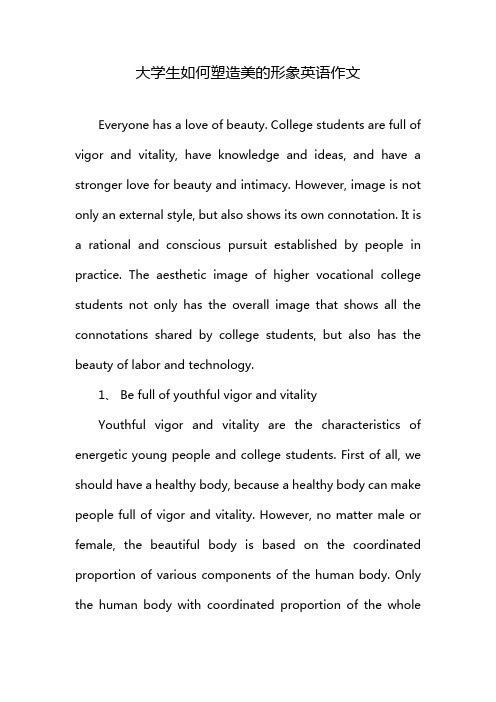
大学生如何塑造美的形象英语作文Everyone has a love of beauty. College students are full of vigor and vitality, have knowledge and ideas, and have a stronger love for beauty and intimacy. However, image is not only an external style, but also shows its own connotation. It is a rational and conscious pursuit established by people in practice. The aesthetic image of higher vocational college students not only has the overall image that shows all the connotations shared by college students, but also has the beauty of labor and technology.1、 Be full of youthful vigor and vitalityYouthful vigor and vitality are the characteristics of energetic young people and college students. First of all, we should have a healthy body, because a healthy body can make people full of vigor and vitality. However, no matter male or female, the beautiful body is based on the coordinated proportion of various components of the human body. Only the human body with coordinated proportion of the wholebody, moderate fat and thin, appropriate muscle distribution, and full of elasticity and strength is a truly beautiful human body, which is mainly obtained through movement and exercise. Sports is a plastic art combining health and beauty. It is known as "the sculpture of body". College students in their youth have a strong plasticity of body. As long as they actively participate in sports and exercise, they can get a healthy body.Secondly, the body-building is linked with the beautiful posture, which makes people full of vigor and vitality. As the saying goes: "standing has standing posture, sitting has sitting posture, eating has eating posture." Is to emphasize attention to behavior and posture. Specifically, people believe that "standing like a pine, sitting like a clock, lying like a bow, walking like the wind" is a beautiful gesture. However, the posture of beauty is not innate, but acquired through training. It is a reflection of people's cultural cultivation and aesthetic taste. College students can receive this training in military training and physical education. As long as they pay attention to it at ordinary times, it is not difficult to have a beautifulposture, and it will make college students look more youthful.Youth and vitality are not only physical fitness and flexible posture, but also higher requirements, that is, to care for and pay attention to life, work, others and everything around, and have the desire to explore and communicate, which are reflected in people's appearance. If a person closes his heart, doesn't want to pay attention to the external world, and refuses to deal with people, he will show what we call "expressionless", without vitality and vitality. As college students, they should have a lively, cheerful and confident expression that they are willing to open their hearts and communicate with others. Of course, this expression is not inherent in people. It needs to be consciously trained to become a basic expression of oneself. It can always convey the inner information of paying attention to the outside world and being full of emotion and interest in the outside world. This is also a foundation for career success.2、 Cultivate good mannersSelf-cultivation is a necessary character for collegestudents. He is cultivated and formed in life practice. It is the overall feature of knowledge, ability and self-restraint. It is the light that makes people's image transparent and shiny. It is a style that can only be understood but can not be expressed. Self cultivation style is mainly manifested in appearance, etiquette and speech.The appearance is expressed through people's appearance and clothes. Generally speaking, the appearance is "given by parents". It is difficult for people to choose and change it by themselves, but they can create it according to their own wishes. Appropriate, appropriate and harmonious dress is an important part of style. At the same time, appropriate makeup is also an important means to beautify ourselves. However, makeup is not to completely change ourselves and make ourselves become stars and beauties, but to emphasize personality and inherent beauty on the basis of developing strengths and avoiding weaknesses. The youthful vitality of college students is a valuable asset in itself. If there are no obvious shortcomings to be covered, there is no need to smeartoo much, but the beauty of "Lotus comes from clear water. Natural carving" should be maintained. In terms of clothing, we should choose according to our own physical conditions, so that it can add to the natural beauty of the body and cover up the shortcomings of the body. The clothing of college students should have "student taste", which is the breath of youth and knowledge. The combination of proper and appropriate clothing and tidiness will make you look "elegant" and have great cultivation and demeanor.Appearance is a person's temperament, the exposure of his inner world, sincerity or hypocrisy, enthusiasm or indifference, elegance or vulgarity, which can be seen at a glance. Therefore, the key to the beauty of appearance lies in the beauty of soul and the cultivation of one's own kind, honest, modest and simple character.Etiquette, as a code of conduct in people's social activities, is an integral part of culture and a symbol of social civilization. Whether people's speech and behavior can conform to etiquette, showing the level of internal cultural literacy, ofcourse, is also a beam of light that constitutes demeanor. Therefore, polite people always have an elegant temperament and "gentleman demeanor". As college students, they should be familiar with the etiquette of general communication activities, such as first meeting, party, banquet, Congratulations, gifts, visiting doctors, mourning, visiting friends, presenting flowers, dancing, visiting, etc., and be able to use them appropriately in various activities. Taking conversation as an example, there are three main points of courtesy in conversation: first, the attitude should be sincere, natural and generous. Secondly, pay attention to distinguish the conversation objects and give them corresponding etiquette. The most important thing is not to be rude, unreasonable, hurtful and full of swearing and swearing.Speech is more closely related to people's knowledge and wisdom, because elegant and witty speech most shows people's cultivated demeanor. Elegant speech is appropriate and beautiful, rich and broad in content, and has great attraction. It often makes people fascinated. Praise wordsautomatically arise: "listening to your words is better than reading for ten years." Machine intelligence in speech makes speech humorous and natural and unrestrained. Elegant and witty speech is the expression of erudition and wisdom. "Having poetic and scholarly atmosphere in the stomach" means that people who have read poetry and books will naturally have beautiful temperament and demeanor. In real life, beautiful appearance, gorgeous clothes and free and easy behavior naturally have a kind of demeanor. If you open your mouth and talk mediocre, shallow and vulgar, your demeanor will decrease sharply. This shows the relationship between demeanor and people's internal wisdom and knowledge. As college students, in addition to professional study, they need to extensively explore all aspects of knowledge, broaden their horizons, expand their ideas, and increase the thickness of knowledge and wisdom, so as to gradually make their speech elegant and witty, and show good self-cultivation demeanor.Third, students should have a smart mind and noble personality Smart and noble refers to the expression of CollegeStudents' inner world - intelligence, ideals, personality, sentiment, etc. in their behavior. If their behavior reflects the beautiful spiritual values recognized by the society and the characteristics of smart and noble, it constitutes the profound connotation of the image of College Students' beauty.As a college student, wisdom and talent are essential, and wisdom and talent are important elements of the image of College Students' beauty. Democritus, an ancient Greek scholar, said that if the beauty of the body is not combined with intelligence, it is something animal. This is because wisdom and talent are the most important factors to realize human value and the basis of beauty. Since ancient times, human power, dexterity and talent have been loved and respected by people, and have been constantly transformed into beauty. Generally, college students are smart, but wisdom and talent are not innate. They need to learn and accumulate. Moreover, wisdom and talent are not limited to professional knowledge. They are multifaceted, versatile, clever and so on, which can best enhance the beauty of College Students' image.Of course, just as Einstein, the great scientist, said, "it is not enough to educate people with professional knowledge. Through professional education, he can become a useful machine, but he can not become a person with harmonious development. Otherwise, he, together with his professional knowledge, will be more like a well-trained dog than a person with harmonious development." That is to say, all human wisdom, talents, strength and skills must be combined with goodness to radiate the light of beauty. The key to this combination is the establishment of life goals and life ideals. Great life goals and ideals, together with wisdom and talent, make a person's life more valuable and meaningful. However, low-level life goals and ideals, such as for enjoyment, to meet personal desires and narrow sense "self realization", will bound and restrict the development of wisdom and talent, making people's life vulgar, low-level, selfish and meaningless.Great life goals and ideals will also make people have noble personality and good sentiment. Lei Feng, a communist soldier, has practiced his ideal goal of "putting his limited lifeinto unlimited service for the people" all his life. His selfless dedication and collectivism have set a good example for college students.Noble personality and good sentiment are mainly manifested in kindness, integrity, modesty and so on. Kindness is the love for all living and beautiful things, which is the basis of human nature. Integrity, impartiality and frankness are a style of life. Honest people are always open-minded and aboveboard. Modesty is an attitude to life based on the correct estimation of oneself and others. Modest people are always modest, calm and open-minded. In daily life, people like modest people, because modest people have an insatiable demand for themselves and can constantly improve themselves: they can always see the strengths of others and respect others, so they can establish a kind of friendly and modest relationship between people, and it is easier to achieve mutual solidarity and friendship.Youth, self-cultivation, wisdom and nobility are the main components of the image of beauty of college students, andalso the display of the temperament of human beauty.4、 Seek and create beauty in labor.One of the important goals of higher vocational education is to strengthen the cultivation of hands-on ability, practical ability and skills. The objects of labor, means of production and material products all have aesthetic value. Especially in the era of scientific and technological revolution, with the popularization of labor aesthetics and technical aesthetics, the combination of beauty and labor technology will promote the development of science and technology. We should correctly guide students to perceive beauty in experimental training and practical work, and create new images and new beauty through association and imagination.At present, we have embarked on a great journey spanning the century, and cultivating ourselves into a truly beautiful college student and a truly beautiful modern man is the great trust and high expectation placed on every college student by the times.。
孔子和苏格拉底的教育思想对比英语作文

孔子和苏格拉底的教育思想对比英语作文全文共3篇示例,供读者参考篇1Comparison of the Educational Thoughts of Confucius and SocratesEducation is a fundamental aspect of human development and has been a topic of great interest throughout history. Two of the most prominent figures in the realm of education are Confucius, a Chinese philosopher, and Socrates, a Greek philosopher. Despite living in different time periods and cultures, both Confucius and Socrates made significant contributions to the field of education through their unique perspectives and teachings. In this essay, we will compare and contrast the educational thoughts of Confucius and Socrates, exploring the similarities and differences in their ideas about the purpose and methods of education.Confucius, also known as Kong Zi, lived in China during the Spring and Autumn period. He believed that education was crucial for the moral and intellectual development of individuals, as well as for the betterment of society as a whole. Confuciusemphasized the importance of self-cultivation, moral integrity, and social harmony in education. He believed that education should focus on character development, virtue, and ethical behavior. Confucius advocated for a hierarchical system of education, where teachers were respected and revered, and students were expected to show filial piety and respect for their elders.Socrates, on the other hand, was a philosopher in ancient Greece who lived during the Classical period. He is often credited as the founder of Western philosophy and is famous for his method of questioning, known as the Socratic method. Socrates believed that education was a process of self-discovery and critical thinking. He encouraged his students to question everything, to think for themselves, and to seek knowledge through dialogue and inquiry. Socrates believed that true education should lead to self-awareness, intellectual growth, and the pursuit of truth.Despite their differences, Confucius and Socrates shared some common beliefs about education. Both philosophers believed in the importance of moral development andself-improvement. They both emphasized the role of the teacher in guiding and mentoring students on their educational journey.They also believed that education should be a lifelong pursuit, not just something that happens in school but a continuous process of learning and self-improvement.However, there were also significant differences in the educational thoughts of Confucius and Socrates. Confucius focused more on the importance of social roles and hierarchical relationships in education, while Socrates emphasized individual autonomy and critical thinking. Confucius believed in the importance of tradition and cultural values, while Socrates valued intellectual inquiry and the pursuit of truth above all else. Confucius viewed education as a means to maintain social order and harmony, while Socrates saw it as a way to challenge authority and question convention.In conclusion, the educational thoughts of Confucius and Socrates provide valuable insights into the nature and purpose of education. While they had different perspectives and approaches, both philosophers shared a common goal of promoting moral and intellectual development in individuals. Confucius's emphasis on tradition, virtue, and social harmony complemented Socrates's focus on critical thinking,self-discovery, and intellectual inquiry. By studying the ideas of Confucius and Socrates, we can gain a deeper understanding ofthe complexities of education and the diverse perspectives that have shaped this essential aspect of human society.篇2Comparison of Confucius and Socrates' Educational ThoughtsIntroductionEducation is an essential aspect of human development and civilization. Throughout history, numerous philosophers and scholars have contributed their thoughts on education. Among them, two prominent figures are Confucius from China and Socrates from ancient Greece. Both Confucius and Socrates proposed unique educational philosophies that have left a significant impact on their respective cultures. In this essay, we will compare and contrast the educational thoughts of Confucius and Socrates.Confucius' Educational ThoughtsConfucius, also known as Kong Zi, was a Chinese philosopher and educator who lived during the Spring and Autumn period. He emphasized the importance of education in cultivating moral character and achieving social harmony. Confucius believed that education should focus on moral cultivation, self-improvement,and filial piety. His educational thoughts can be summarized as follows:1. Self-cultivation: Confucius believed that education should begin with self-cultivation. He emphasized the importance of self-discipline, self-reflection, and self-improvement. Confucius taught that individuals should strive to become good persons by cultivating virtues such as filial piety, loyalty, righteousness, and propriety.2. Family ethics: Confucius stressed the significance of family ethics in education. He believed that filial piety, respect for elders, and harmonious family relationships were essential for building a strong society. Confucius viewed the family as the foundation of social order and morality.3. Social harmony: Confucius advocated for social harmony through education. He believed that education should promote social cohesion, harmony, and peace. Confucius emphasized the importance of moral education in creating a just and harmonious society.Socrates' Educational ThoughtsSocrates was a Greek philosopher and educator who lived during the Classical period. He is known for his method ofinquiry, the Socratic method, which involves asking questions to stimulate critical thinking and self-discovery. Socrates' educational thoughts can be summarized as follows:1. Dialogue and questioning: Socrates believed in the power of dialogue and questioning in education. He encouraged his students to engage in critical thinking, self-examination, and debate. Socrates believed that true knowledge could only be attained through questioning and self-discovery.2. Ethical inquiry: Socrates emphasized ethical inquiry and moral reflection in education. He believed that education should focus on cultivating virtues, such as wisdom, courage, temperance, and justice. Socrates taught that ethical inquiry was essential for personal growth and moral development.3. Self-knowledge: Socrates emphasized the importance of self-knowledge in education. He believed that individuals should strive to know themselves, understand their values, and lead a examined life. Socrates taught that self-knowledge was the key to personal fulfillment and happiness.Comparison and ContrastWhile Confucius and Socrates had different cultural backgrounds and lived in different historical contexts, theyshared some common principles in their educational thoughts. Both Confucius and Socrates believed in the importance of moral education, self-cultivation, and ethical inquiry. However, there were also significant differences between their educational philosophies.Confucius focused on the cultivation of moral character, family ethics, and social harmony in education, while Socrates emphasized dialogue, questioning, and self-knowledge. Confucius viewed education as a means to promote social cohesion and harmony, while Socrates saw education as a tool for personal growth and self-realization. Confucius emphasized the importance of tradition, hierarchy, and social order, while Socrates valued individual autonomy, critical thinking, and intellectual inquiry.In conclusion, the educational thoughts of Confucius and Socrates have made a lasting impact on human civilization. Both philosophers emphasized the importance of education in personal growth, moral development, and social harmony. While Confucius focused on moral cultivation and social ethics, Socrates emphasized dialogue, self-knowledge, and ethical inquiry. By studying and comparing the educational thoughts ofConfucius and Socrates, we can gain insights into the different perspectives on education and the human condition.篇3Comparison of Confucius and Socrates' Educational PhilosophiesEducation is a fundamental aspect of society that shapes the values, beliefs, and behaviors of individuals. Two prominent philosophers, Confucius in China and Socrates in ancient Greece, developed distinct educational philosophies that continue to influence educational practices today. This essay aims to compare the educational philosophies of Confucius and Socrates, highlighting their similarities and differences.Confucius, also known as Kongzi or Kong Fuzi, was a Chinese philosopher who lived during the Spring and Autumn Period of Chinese history. He emphasized the importance of education in cultivating moral character and social harmony. Confucius believed that education should focus on moral cultivation,self-improvement, and the pursuit of benevolence (ren). He emphasized the importance of rituals, etiquette, and filial piety in shaping individuals' moral character. Confucius' educationalphilosophy was based on the principles of lifelong learning, self-reflection, and ethical conduct.On the other hand, Socrates was an ancient Greek philosopher who lived during the Classical Period of Greek history. Socrates is known for his belief in the power of inquiry, critical thinking, and self-examination. He developed the Socratic Method, a dialectical approach to teaching that involves asking probing questions to stimulate critical thinking andself-awareness. Socrates believed that true knowledge comes from questioning assumptions, examining beliefs, and seeking the truth through rational inquiry. He emphasized the importance of intellectual humility, open-mindedness, and intellectual curiosity in the pursuit of knowledge.Despite their cultural and historical differences, Confucius and Socrates shared some common educational beliefs and values. Both philosophers believed in the transformative power of education in shaping individuals' characters, values, and behaviors. They both emphasized the importance ofself-cultivation, moral integrity, and social responsibility. Confucius and Socrates both promoted the idea that education should empower individuals to become virtuous and wise citizens who contribute positively to society.However, Confucius and Socrates also had different educational approaches and methods. Confucius emphasized the importance of tradition, rituals, and social norms in shaping individuals' moral character. He believed that education should focus on instilling moral virtues, ethical values, and social harmony through rituals, etiquette, and filial piety. Confucius' educational philosophy was based on the principles of harmony, hierarchy, and filial piety.Socrates, on the other hand, questioned traditional beliefs, challenged societal norms, and encouraged individuals to think critically and independently. He believed that education should stimulate intellectual curiosity, encourage self-examination, and promote rational inquiry. Socrates' educational philosophy was based on the principles of inquiry, debate, and self-reflection.In conclusion, the educational philosophies of Confucius and Socrates highlight the importance of moral cultivation, critical thinking, and self-awareness in education. While Confucius emphasized the importance of tradition, rituals, and social harmony in shaping individuals' moral character, Socrates advocated for questioning assumptions, challenging beliefs, and seeking the truth through rational inquiry. Despite their differences, both philosophers believed in the transformativepower of education in empowering individuals to become virtuous, wise, and responsible citizens. Their educational philosophies continue to inspire educators and shape educational practices around the world.。
英语畅谈中国文化 Unit 1

Resources
Exploration
Comprehension ➢ Ideas of paragraphs ➢ Steps of self-cultivation ➢Translation of teachings ➢ Three topics of the
quotations preparing Evaluation
3 Humaneness comes from family reverence which is cultivated
through intimate relationship between parents and their children. T 4 No matter Ewvhaalut ahtaiopnpens, a person should not travel afar if his parents are stipllraelpivaer.inFg
Navigation
To understand the theme value of Confucius philosophy. ToLaeapdp-rienciate Confucius’ thought on self-cultivating frommafpapminigly reverence to harmonious relationships.
1
iEnvhaerliuteadtiforonm ancient times.
4
Tphereprealartiinognship between father and son is fundamental for
human beings according to Confucius.
以修身为本的作文素材
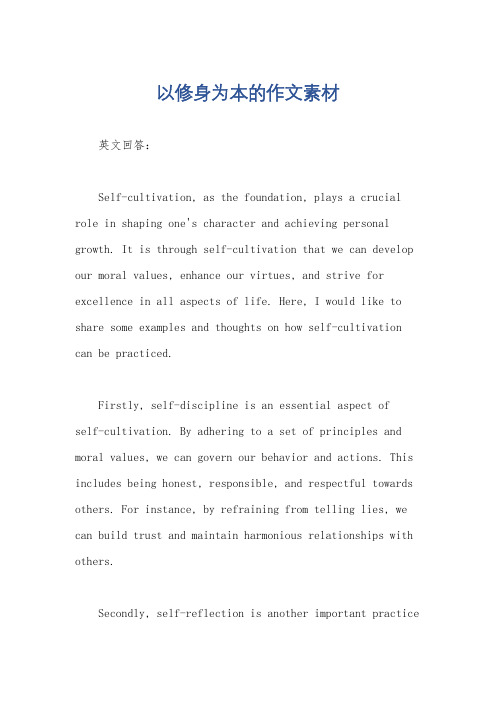
以修身为本的作文素材英文回答:Self-cultivation, as the foundation, plays a crucial role in shaping one's character and achieving personal growth. It is through self-cultivation that we can develop our moral values, enhance our virtues, and strive for excellence in all aspects of life. Here, I would like to share some examples and thoughts on how self-cultivation can be practiced.Firstly, self-discipline is an essential aspect ofself-cultivation. By adhering to a set of principles and moral values, we can govern our behavior and actions. This includes being honest, responsible, and respectful towards others. For instance, by refraining from telling lies, we can build trust and maintain harmonious relationships with others.Secondly, self-reflection is another important practicein self-cultivation. By regularly reflecting on our thoughts, words, and actions, we can identify our strengths and weaknesses and make necessary improvements. For example, if we realize that we tend to be impatient, we can consciously work on developing patience by practicing mindfulness and understanding others' perspectives.Furthermore, self-education is a vital part of self-cultivation. By continuously seeking knowledge and learning new skills, we can broaden our horizons and become well-rounded individuals. This includes reading books, attending seminars, and engaging in meaningful discussions. Through self-education, we can not only acquire knowledge but also develop critical thinking and problem-solving abilities.In addition, self-care is an integral aspect of self-cultivation. Taking care of our physical and mental well-being is essential for personal growth. This includes maintaining a balanced diet, engaging in regular exercise, and practicing mindfulness or meditation. By prioritizing self-care, we can improve our overall health and achieve a sense of inner peace.中文回答:修身为本是塑造个人品格和实现个人成长的关键。
大学生看待儒家思想的英语作文
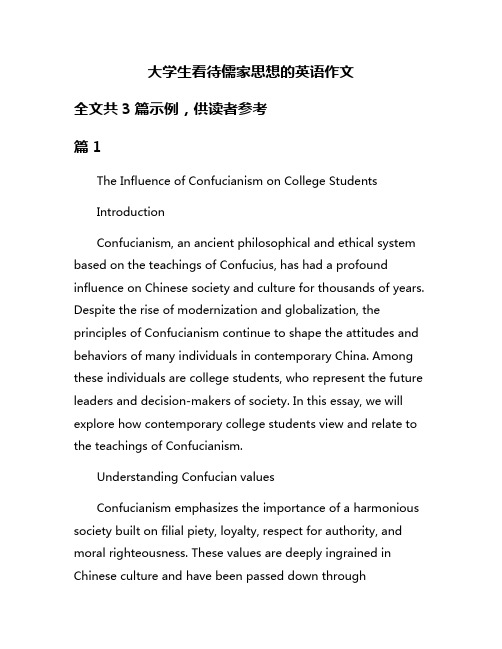
大学生看待儒家思想的英语作文全文共3篇示例,供读者参考篇1The Influence of Confucianism on College StudentsIntroductionConfucianism, an ancient philosophical and ethical system based on the teachings of Confucius, has had a profound influence on Chinese society and culture for thousands of years. Despite the rise of modernization and globalization, the principles of Confucianism continue to shape the attitudes and behaviors of many individuals in contemporary China. Among these individuals are college students, who represent the future leaders and decision-makers of society. In this essay, we will explore how contemporary college students view and relate to the teachings of Confucianism.Understanding Confucian valuesConfucianism emphasizes the importance of a harmonious society built on filial piety, loyalty, respect for authority, and moral righteousness. These values are deeply ingrained in Chinese culture and have been passed down throughgenerations. For college students, who are at a critical stage of identity formation and moral development, the teachings of Confucianism can serve as a guide for navigating the complexities of modern life.Respect for authorityOne of the central tenets of Confucianism is the respect for authority, particularly towards parents, teachers, and elders. College students who adhere to Confucian values are expected to show deference and obedience to those in positions of power. This can manifest in various ways, such as addressing professors with titles of respect, following rules and regulations set by institutions, and obeying the directives of parents and elders. While some may view this as restrictive or outdated, many college students see it as a way of maintaining social order and stability.Filial pietyFilial piety, or the duty of children to respect and care for their parents, is another key principle of Confucianism. College students who uphold this value often prioritize their family’s needs and well-being above their own. This can involve making sacrifices, such as choosing a practical career path over personal interests or providing financial support to aging parents. Whilethis sense of obligation can be seen as burdensome, many college students view it as a source of strength and meaning in their lives.Morality and righteousnessConfucianism places a strong emphasis on moral conduct and ethical behavior. College students who are influenced by Confucian values strive to cultivate virtues such as honesty, integrity, and compassion in their interactions with others. This can lead to a sense of inner peace and fulfillment, as well as a desire to contribute positively to society. While the pressures of academic performance and career aspirations may tempt some students to compromise their principles, many find solace in the timeless wisdom of Confucian teachings.Implications for the futureAs college students grapple with the competing demands of tradition and modernity, the relevance of Confucianism in their lives remains a topic of ongoing debate and reflection. While some may see it as a source of guidance and inspiration, others may view it as a source of constraint and limitation. Ultimately, the choice to embrace or reject Confucian values lies with each individual, as they navigate the complexities of a rapidly changing world.ConclusionIn conclusion, the teachings of Confucianism continue to play a significant role in shaping the attitudes and behaviors of college students in China. By upholding values such as respect for authority, filial piety, and moral righteousness, students can cultivate a sense of purpose and integrity that will guide them throughout their lives. As the future leaders and decision-makers of society, it is essential for college students to critically engage with the teachings of Confucianism and consider how they can adapt and apply them to meet the challenges of the modern world. Only by embracing the wisdom of the past can they hope to build a brighter future for themselves and their communities.篇2The Influence of Confucianism on Contemporary College StudentsIntroductionConfucianism is one of the most influential philosophical and ethical systems developed in ancient China, founded by Confucius in the 5th century BC. It emphasizes the importance of self-cultivation, social harmony, and moral integrity. Despite being thousands of years old, Confucianism still plays asignificant role in shaping the values and beliefs of Chinese society today. This essay will explore how contemporary college students view and interpret Confucianism, and the impact it has on their lives.Understanding ConfucianismConfucianism is deeply rooted in Chinese culture and has had a profound impact on various aspects of society, including education, politics, and ethics. One of the core principles of Confucianism is the concept of filial piety, which emphasizes the importance of respecting and honoring one's parents. This value is still widely held in Chinese society, where children are expected to care for their parents as they age.Another key aspect of Confucianism is the emphasis on education and self-improvement. Confucius believed that individuals should strive to cultivate their moral character and intellect in order to become virtuous and wise. This idea is reflected in the emphasis on academic achievement and personal development in contemporary Chinese education.The Influence of Confucianism on College StudentsIn recent years, there has been a resurgence of interest in Confucianism among Chinese youth, including college students.Many young people are drawn to the moral and ethical teachings of Confucius as a source of guidance in their increasingly complex and fast-paced lives. Some students see Confucianism as a way to navigate the pressures of academic success, social relationships, and personal growth.For college students, the teachings of Confucianism can provide valuable insights into how to live a meaningful and fulfilling life. The emphasis on self-cultivation and moral integrity resonates with young people who are searching for a sense of purpose and direction in the modern world. By studying Confucian texts and engaging with traditional rituals and practices, students can deepen their understanding of themselves and their place in the world.In addition, Confucianism can also have a practical impact on the lives of college students. The emphasis on respect for authority, social harmony, and ethical behavior can influence how students interact with their peers, teachers, and the wider community. By embodying Confucian values such as benevolence, righteousness, and propriety, students can cultivate positive relationships and contribute to a harmonious and ethical society.Challenges and CriticismsDespite its enduring relevance, Confucianism is not without its critics. Some people argue that Confucian values are outdated and stifling, and that they can inhibit individuality and creativity. Critics also point to the hierarchical nature of Confucian society, where social status and obedience to authority are prioritized over personal autonomy and freedom.For college students, navigating the complex interplay between traditional Confucian values and modern ideals of individualism and self-expression can be challenging. Some students may struggle to reconcile the expectations of their families and society with their own desires for personal fulfillment and self-actualization. This tension between tradition and modernity can create a sense of cultural dissonance and identity crisis for young people.ConclusionIn conclusion, Confucianism continues to exert a powerful influence on contemporary college students in China. Its emphasis on self-cultivation, moral integrity, and social harmony provides young people with valuable insights into how to live a meaningful and ethical life. By engaging with the teachings of Confucius, students can deepen their understanding ofthemselves and their place in the world, and contribute to a more harmonious and virtuous society.While there are challenges and criticisms associated with Confucianism, its enduring relevance and impact on Chinese culture cannot be denied. For college students, the teachings of Confucius offer a source of wisdom and guidance in navigating the complexities of the modern world. By embracing the values of Confucianism and integrating them with contemporary ideals, young people can cultivate a balanced and fulfilling life that honors both tradition and innovation.篇3Title: College Students' View on ConfucianismIntroduction:In today's fast-paced world, many college students find themselves facing immense pressure and uncertainty. In such times, turning to traditional wisdom and philosophies can often provide guidance and a sense of grounding. One such ancient philosophy that has been of interest to many is Confucianism. As a system of thought that emphasizes ethics, morality, and social values, Confucianism offers valuable insights for college students navigating the complexities of modern life.Body:Confucianism, founded by the Chinese philosopher Confucius in the 6th century BC, has had a profound impact on Chinese society and culture for centuries. Its core principles revolve around the importance of filial piety, respect for authority, and the cultivation of virtue. For college students, these teachings can serve as a source of inspiration and guidance as they strive to develop their personal and professional identities.One key aspect of Confucianism that resonates with many college students is its emphasis on ethical behavior and moral rectitude. In a world where success is often equated with material wealth and social status, the teachings of Confucius remind students of the importance of integrity, compassion, and respect for others. By following the principles of Confucian ethics, students can cultivate a strong sense of character and build meaningful relationships with their peers and professors.Another key tenet of Confucianism that is relevant to college students is the concept of self-cultivation. According to Confucian teachings, individuals have a moral obligation to continually strive for self-improvement through education,self-reflection, and the pursuit of virtue. This idea of lifelonglearning and personal growth can be particularly empowering for college students who are on a journey of self-discovery and intellectual development.Furthermore, Confucianism emphasizes the importance of social harmony and the proper conduct of individuals in society. College students who adhere to Confucian values are more likely to contribute positively to their communities, promote cooperation and understanding among diverse groups, and uphold the common good. By embracing the principles of benevolence, righteousness, and propriety, students can become ethical leaders and role models in their academic and professional environments.Conclusion:In conclusion, Confucianism offers college students a valuable framework for navigating the complexities of modern life and developing a strong sense of morality, integrity, and social responsibility. By embracing the teachings of Confucius, students can cultivate a deeper understanding of themselves and their place in the world, build meaningful relationships with others, and contribute positively to society. As we face the challenges of the 21st century, the wisdom of Confucianismcontinues to inspire and guide us on our journey towards personal and collective flourishing.。
提升自我修养,铸就鸿鹄之志作文
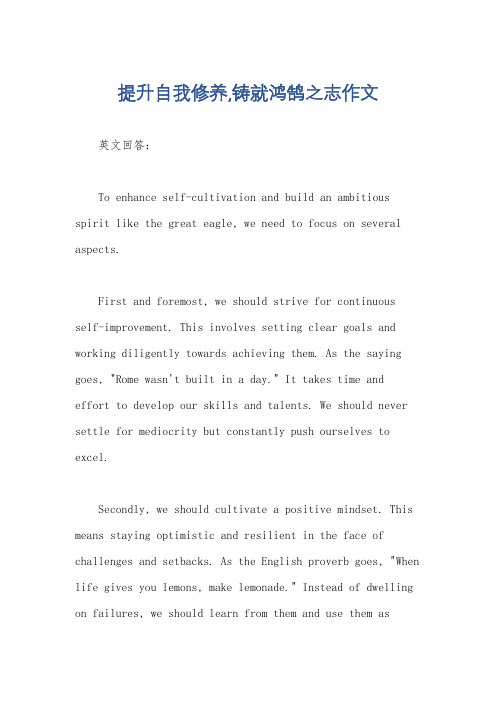
提升自我修养,铸就鸿鹄之志作文英文回答:To enhance self-cultivation and build an ambitiousspirit like the great eagle, we need to focus on several aspects.First and foremost, we should strive for continuousself-improvement. This involves setting clear goals and working diligently towards achieving them. As the saying goes, "Rome wasn't built in a day." It takes time andeffort to develop our skills and talents. We should never settle for mediocrity but constantly push ourselves to excel.Secondly, we should cultivate a positive mindset. This means staying optimistic and resilient in the face of challenges and setbacks. As the English proverb goes, "When life gives you lemons, make lemonade." Instead of dwelling on failures, we should learn from them and use them asstepping stones towards success.Furthermore, it is essential to develop good character and moral values. As the Chinese idiom goes, "修身齐家治国平天下" (xiū shēn qí jiā zhì guó píng tiān xià), which means that personal cultivation is the foundation for maintaining a harmonious family, governing a nation, and achieving peace in the world. Honesty, integrity, and compassion are virtues that we should strive to embody in our daily lives.In addition, we should also prioritize self-care and well-being. Just like the saying, "You can't pour from an empty cup," we need to take care of ourselves physically, mentally, and emotionally in order to be able to contribute to the world around us. This includes getting enough rest, eating nutritious food, exercising regularly, andpracticing mindfulness or meditation to reduce stress and maintain inner balance.Lastly, we should embrace lifelong learning. As the English proverb goes, "You're never too old to learn." Weshould be open-minded, curious, and willing to explore new knowledge and experiences. Continuous learning not only broadens our horizons but also keeps our minds sharp and adaptable in an ever-changing world.中文回答:提升自我修养,铸就鸿鹄之志,我们需要关注几个方面。
提升自我修养,铸就鸿鹄之志作文
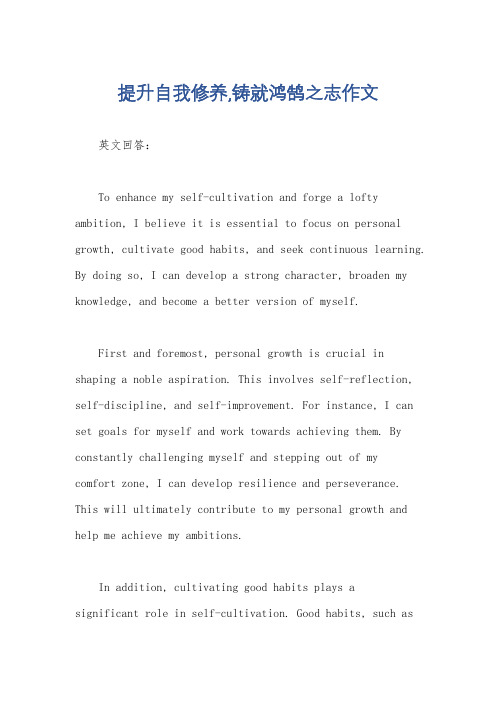
提升自我修养,铸就鸿鹄之志作文英文回答:To enhance my self-cultivation and forge a lofty ambition, I believe it is essential to focus on personal growth, cultivate good habits, and seek continuous learning. By doing so, I can develop a strong character, broaden my knowledge, and become a better version of myself.First and foremost, personal growth is crucial in shaping a noble aspiration. This involves self-reflection, self-discipline, and self-improvement. For instance, I can set goals for myself and work towards achieving them. By constantly challenging myself and stepping out of mycomfort zone, I can develop resilience and perseverance. This will ultimately contribute to my personal growth and help me achieve my ambitions.In addition, cultivating good habits plays asignificant role in self-cultivation. Good habits, such aspunctuality, honesty, and perseverance, not only reflect one's character but also contribute to one's success. For example, by being punctual, I can demonstrate respect for others' time and build trust with colleagues and friends. By being honest, I can establish strong relationships based on trust and integrity. By persevering, I can overcome obstacles and achieve my goals. Therefore, it is crucial to cultivate these habits in order to enhance my self-cultivation and forge a noble ambition.Furthermore, continuous learning is essential for self-improvement and personal growth. Learning can take various forms, such as reading books, attending seminars, or acquiring new skills. By continuously learning, I can broaden my knowledge, gain new perspectives, and develop critical thinking skills. For example, by reading books on different subjects, I can expand my horizons and develop a deeper understanding of the world. By attending seminars or workshops, I can learn from experts in various fields and gain valuable insights. By acquiring new skills, such as learning a new language or mastering a musical instrument, I can challenge myself and develop new talents. Therefore,continuous learning is crucial in enhancing my self-cultivation and forging a noble ambition.In conclusion, to enhance my self-cultivation and forge a lofty ambition, I need to focus on personal growth, cultivate good habits, and seek continuous learning. By doing so, I can develop a strong character, broaden my knowledge, and become a better version of myself. Through self-reflection, self-discipline, and self-improvement, I can shape a noble aspiration. By cultivating good habits, such as punctuality, honesty, and perseverance, I can reflect my character and contribute to my success. By continuously learning, I can broaden my knowledge, gain new perspectives, and develop critical thinking skills. Therefore, it is essential to prioritize self-cultivation and strive for continuous improvement in order to achieve my ambitions.中文回答:为了提升自我修养,铸就鸿鹄之志,我相信关注个人成长、培养良好习惯和不断学习是至关重要的。
提高自身修养 英语作文
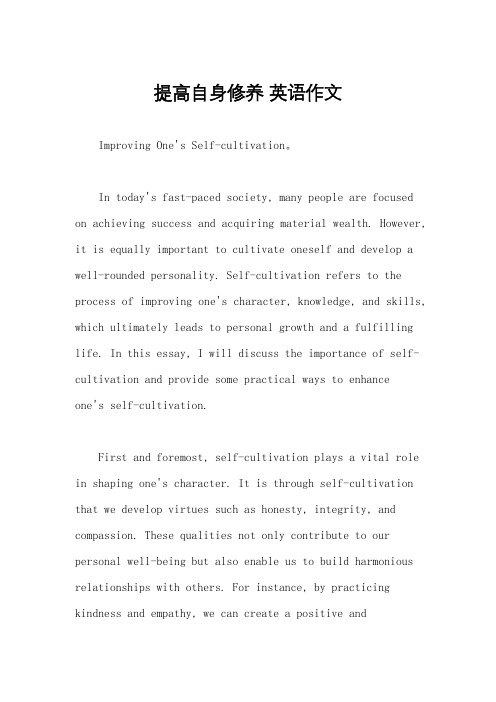
提高自身修养英语作文Improving One's Self-cultivation。
In today's fast-paced society, many people are focused on achieving success and acquiring material wealth. However, it is equally important to cultivate oneself and develop a well-rounded personality. Self-cultivation refers to the process of improving one's character, knowledge, and skills, which ultimately leads to personal growth and a fulfilling life. In this essay, I will discuss the importance of self-cultivation and provide some practical ways to enhanceone's self-cultivation.First and foremost, self-cultivation plays a vital role in shaping one's character. It is through self-cultivation that we develop virtues such as honesty, integrity, and compassion. These qualities not only contribute to our personal well-being but also enable us to build harmonious relationships with others. For instance, by practicing kindness and empathy, we can create a positive andsupportive environment around us. Furthermore, self-cultivation helps us to become more self-aware and reflective, allowing us to identify our strengths and weaknesses and work towards self-improvement.In addition to character development, self-cultivation involves the pursuit of knowledge and intellectual growth. Continuous learning is essential for personal development and staying relevant in an ever-changing world. Reading books, attending seminars, and engaging in intellectual discussions are effective ways to expand our knowledge and broaden our perspectives. Moreover, acquiring new skills and expertise not only enhances our professional competence but also boosts our self-confidence and adaptability. By constantly seeking new knowledge and skills, we can remain competitive and open up new opportunities for personal and career growth.Furthermore, self-cultivation encompasses the cultivation of physical and mental well-being. Taking care of our physical health through regular exercise, a balanced diet, and sufficient rest is crucial for maintaining a highlevel of energy and vitality. Engaging in activities such as yoga, meditation, or mindfulness can also help to improve our mental well-being, reduce stress, and enhance our ability to focus and concentrate. Moreover, engaging in hobbies and creative pursuits can provide a sense of fulfillment and joy, allowing us to express ourselves and unleash our potential.Now that we understand the importance of self-cultivation, let us explore some practical ways to enhance it. Firstly, setting goals and creating a personal development plan can provide a clear direction and motivation for self-improvement. By identifying areas that need improvement and setting specific goals, we can track our progress and stay committed to our self-cultivation journey. Secondly, seeking feedback from others and being open to constructive criticism can help us gain valuable insights and identify areas for growth. Additionally, finding mentors or role models who inspire us and embody the qualities we admire can provide guidance and support in our self-cultivation efforts. Finally, it is important to cultivate a lifelong learning mindset and embrace newchallenges and experiences. By stepping out of our comfort zone and embracing new opportunities, we can continuously learn and grow.In conclusion, self-cultivation is essential for personal growth and a fulfilling life. It involves the development of character, the pursuit of knowledge, and the cultivation of physical and mental well-being. By focusing on self-cultivation and implementing practical strategies, we can enhance our personal development and become better individuals. Let us strive to improve ourselves continuously and create a positive impact on the world around us.。
修养自身改变他人再改变环境英语作文
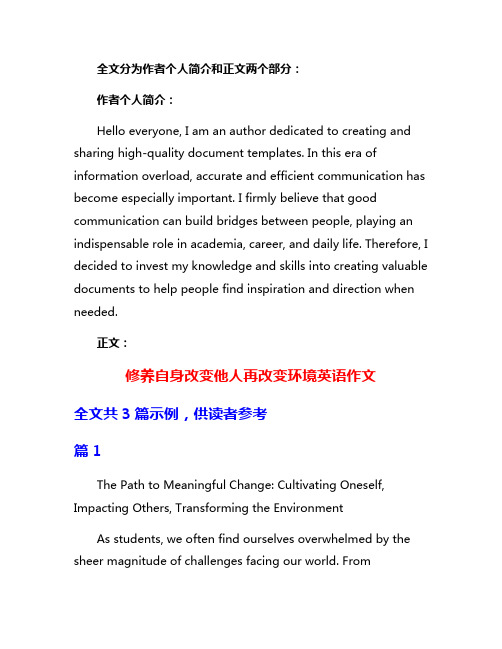
全文分为作者个人简介和正文两个部分:作者个人简介:Hello everyone, I am an author dedicated to creating and sharing high-quality document templates. In this era of information overload, accurate and efficient communication has become especially important. I firmly believe that good communication can build bridges between people, playing an indispensable role in academia, career, and daily life. Therefore, I decided to invest my knowledge and skills into creating valuable documents to help people find inspiration and direction when needed.正文:修养自身改变他人再改变环境英语作文全文共3篇示例,供读者参考篇1The Path to Meaningful Change: Cultivating Oneself, Impacting Others, Transforming the EnvironmentAs students, we often find ourselves overwhelmed by the sheer magnitude of challenges facing our world. Fromenvironmental degradation and social injustice to political turmoil and economic disparities, the issues can seem insurmountable. However, amidst this apparent chaos, there lies a profound truth – the power to catalyze meaningful change lies within each of us, through the cultivation of our inner selves.The journey towards impacting our surroundings begins with an inward exploration, a commitment to personal growth and self-betterment. It is through this process of self-discovery and self-improvement that we equip ourselves with the tools to inspire and influence those around us, ultimately shaping the world we inhabit.Cultivating oneself is not a mere exercise in navel-gazing; rather, it is a conscious effort to align our thoughts, words, and actions with the principles of wisdom, compassion, and integrity. By examining our beliefs, biases, and behaviors, we can identify areas that require refinement and work towards becoming more thoughtful, empathetic, and ethical individuals.One of the most powerful catalysts for personal growth is the pursuit of knowledge. Through education, we expand our intellectual horizons, challenging our preconceived notions and broadening our perspectives. The more we learn, the more we recognize the interconnectedness of all things, fostering adeeper appreciation for diversity and a commitment to understanding different viewpoints.Alongside intellectual enrichment, emotional intelligence plays a pivotal role in our self-cultivation. Developingself-awareness, managing our emotions effectively, and cultivating empathy towards others are essential skills that not only improve our personal well-being but also enhance our ability to connect with and influence those around us.As we embark on this journey of self-improvement, we must embrace the virtues of humility and open-mindedness. Recognizing our own limitations and being receptive to constructive feedback allows us to grow and evolve continuously. It is through this willingness to learn and adapt that we can truly impact those around us in a meaningful and positive way.Once we have made strides in our personal development, we become better equipped to inspire and influence others. Our words carry more weight when backed by the authenticity of our actions, and our presence becomes a beacon of hope and motivation for those seeking positive change.By leading by example and embodying the values we wish to see in the world, we can ignite a ripple effect that radiates outward, touching the lives of our peers, families, andcommunities. Our commitment to personal growth andself-betterment becomes a source of inspiration, encouraging others to embark on their own journeys of self-discovery and self-improvement.Furthermore, as we cultivate ourselves, we develop a heightened sense of responsibility towards our environment. We become more attuned to the intricate web of life that sustains us, recognizing the profound impact our actions have on the natural world. This heightened awareness fosters a deep sense of stewardship, motivating us to make conscious choices that prioritize sustainability and environmental preservation.Ultimately, by cultivating ourselves, we pave the way for transforming not only our immediate surroundings but also the broader world we inhabit. As we inspire others to embrace personal growth and embrace positive change, we create a ripple effect that extends far beyond our individual lives, impacting entire communities, societies, and even future generations.In a world that often seems consumed by conflict, division, and environmental degradation, the path to meaningful change begins with a journey inward. By committing to our personal growth, nurturing our intellectual and emotional capacities, andembodying the virtues of wisdom, compassion, and integrity, we become agents of positive influence.Through this process of self-cultivation, we inspire those around us to embrace their own journeys of growth andself-discovery, igniting a chain reaction of positive change that has the potential to transform not only our immediate environments but also the broader tapestry of human existence.It is a journey that demands courage, perseverance, and unwavering commitment, but one that holds the promise of a more harmonious, just, and sustainable world. Let us embrace this challenge, for in cultivating ourselves, we sow the seeds of a brighter future for all.篇2Changing the World Starts WithinAs a student, I've been taught that the key to creating positive change in the world lies within each of us as individuals. It's an empowering yet daunting realization - the future is not something that simply happens to us, but something we help shape through our thoughts, words and actions. By cultivating ourselves to be the best version of who we can be, we developthe ability to inspire those around us and ultimately impact the environment and society we inhabit.It begins with self-awareness and a commitment to personal growth. We must take an honest look inward, identifying our strengths, insecurities, biases and areas for improvement. It's not an easy process as we inevitably stumble upon parts of ourselves that are less than flattering. But midst the discomfort lies incredible opportunity for transformation. By acknowledging our flaws with humility, we open the door to overcoming them through conscious effort.This inner journey involves tireless self-reflection, shedding of bad habits, and a dedication to continual learning. We read works by great thinkers to expand our perspective. We step outside our comfort zones, embracing new experiences that challenge assumptions. We practices mindfulness to quiet the internal chatter of fears and doubts. Little by little, we chip away at the aspects that don't serve our higher selves.In their place, we deliberately cultivate the qualities that will elevate us as human beings. Wisdom, integrity, empathy, confidence, resilience - these become the pillars upon which we build a sturdy, admirable character. Our words carry more weight because they are backed by consistency of virtue. Actionsbecome purposeful and authentic expressions of our evolving values.In this process of refining ourselves, something powerful occurs - we become a force that can't help but impact our immediate surroundings. Like a pebble tossed into still waters, the ripples extend outward. Our positive energy, nurturing presence and example of principled living rubs off on those around us in profound ways.First, we positively influence our closest circles - family, friends, peers. They witness the changes in us and cannot avoid being affected to some degree themselves. Our renewed passion and drive sparks insightful discussions that expand their awareness. Our calm centeredness brings them solace during turbulent times. Our determination in the face of obstacles is a quiet inspiration for them to persevere through their own challenges.From this solid foundation of uplifting our personal spheres, the influence gradually extends further into our community. We apply our growth mindset at school by nurturing an environment of diligent study and mutual support among our classmates. In our part-time jobs, we bring an ethic of hard work and caring service that leaves a positive impression on colleagues andcustomers alike. In our extracurriculars and volunteer work, we become catalysts who rally others towards impactful causes.Our consistent commitment to self-improvement and principled conduct earns a quiet admiration from those who bear witness to our perseverance. They become curious about the source of our grounded strength and wisdom beyond our years. Some are compelled to embark on their own journeys of personal growth, and we're able to share the strategies, books and philosophies that facilitated our own evolution. A subtle wake builds as we begin impacting the personal trajectories of an expanding circle of individuals.Eventually, this cumulative effect extends far beyond our immediate communities. Our efforts positively influence policy and decision makers whose work creates change on a broader scale. Our character and competence earns respect that leads to positions of leadership where our values and principles become driving forces. The domino effect of conscientious living provides an alternative narrative in a world often preoccupied with negative sensationalism.That's the amazing potential of personal growth - it triggers a chain reaction that ultimately transforms the very social environment we occupy. What started as an individualcommitment to continually better ourselves reverberates into a legacy of positive influence on a grand scale.Of course, this is an endeavor of perpetual work and immense patience. Changing long-held mindsets, cultural narratives and systemic inequalities doesn't happen overnight. Obstacles of opposition and adversity are guaranteed. There will be disheartening setbacks that test our resolve.But we must remember that every accomplishment of human progress started with just one person deciding to hold themselves to an uncompromising standard. One individual who refused to accept the limitations of their circumstances and instead lived with conviction. A single ray of light that penetrated the darkness and gradually grew into an inviting brilliance.So we commit to this virtuous path, undeterred by the magnitude of its mission. We understand that realizing our potential as positive forces of change is a perpetual, worthy endeavor. With focus and resolve, our commitment to elevating our individualselves translates into the powerful, reverberating impact of elevating humanity itself.篇3Cultivating Oneself to Change Others and Then the EnvironmentAs students, we are often told that we represent the future of our societies and nations. The weight of such an immense responsibility can feel overwhelming at times. How can we, mere individuals, hope to enact positive change in the world around us? The answer, I have come to realize, lies in a deceptively simple yet profoundly powerful concept – cultivating oneself.The journey towards self-cultivation is a lifelong endeavor that requires unwavering dedication, introspection, and a willingness to embrace personal growth. It is a process of refining our thoughts, words, and actions, aligning them with the values and principles we hold dear. By committing to this path, we not only unlock our own potential for positive transformation but also gain the ability to inspire and influence those around us.The ancient Greek philosopher Socrates famously stated, "Know thyself." This maxim serves as a guiding light on the road to self-cultivation. To truly know ourselves, we must embark on a journey of self-discovery, peeling back the layers of our personalities, beliefs, and biases. It is through this process that we can identify the areas in which we need to grow, the habits we must discard, and the virtues we must embrace.One of the most significant virtues to cultivate is empathy –the ability to understand and share the feelings of others. Empathy fosters a profound connection with our fellow human beings, allowing us to perceive the world through their lens and appreciate the diverse experiences that shape their perspectives. By cultivating empathy, we become more compassionate, patient, and understanding, qualities that are essential for building bridges and fostering meaningful connections with those around us.Another virtue that is crucial for self-cultivation is integrity. Integrity is the unwavering adherence to moral and ethical principles, even in the face of adversity or temptation. It is the foundation upon which trust is built, both within ourselves and in our relationships with others. When we cultivate integrity, we become beacons of authenticity and reliability, inspiring others to follow our example and uphold the same standards of honesty and accountability.Resilience is yet another virtue that is indispensable on the path of self-cultivation. Life is a journey filled with challenges, setbacks, and obstacles, and it is our ability to bounce back from these difficulties that ultimately defines our character. By cultivating resilience, we develop the inner strength to perseverethrough hardships, learn from our mistakes, and emerge stronger and wiser on the other side.As we embark on this transformative journey ofself-cultivation, it is essential to remember that change begins within. We cannot hope to inspire positive change in others or in our environment until we have first undertaken the arduous task of transforming ourselves. It is through our own personal growth and the embodiment of virtues such as empathy, integrity, and resilience that we become living examples of the change we wish to see in the world.Once we have committed to the path of self-cultivation, our positive influence naturally extends to those around us. Our words, actions, and demeanor become powerful catalysts for inspiration, encouraging others to reflect on their own lives and strive for personal growth. It is through this ripple effect that we can gradually shape the attitudes and behaviors of our peers, our families, and our communities.Moreover, as we continue to refine ourselves and inspire those around us, our collective efforts can eventually culminate in the transformation of our broader environment. By fostering a culture of empathy, integrity, and resilience within our societies, we can tackle the complex challenges that plague our world,such as inequality, environmental degradation, and social injustice.It is important to recognize that the journey ofself-cultivation is not a linear path. It is a continuous cycle of growth, setbacks, and renewal, punctuated by moments of profound insight and personal transformation. There will be times when we stumble, when our resolve wavers, and when the weight of our responsibilities seems insurmountable. Yet, it is in these moments that we must dig deep, draw upon the virtues we have cultivated, and recommit ourselves to the path of personal and collective growth.In essence, cultivating oneself is not merely a personal pursuit; it is a profound act of service to humanity. By embarking on this journey, we become agents of positive change, inspiring those around us and paving the way for a better, more compassionate, and more sustainable world. It is through our individual efforts to refine our thoughts, words, and actions that we can collectively reshape the narrative of our societies and leave an indelible mark on the world we inhabit.As students, we stand at a critical juncture, poised to shape the future with our ideals, our aspirations, and our unwavering commitment to positive change. Let us embrace the challenge ofself-cultivation, for it is through this transformative process that we can truly unlock our potential to change ourselves, change others, and ultimately, change the world around us.。
cultivate词根
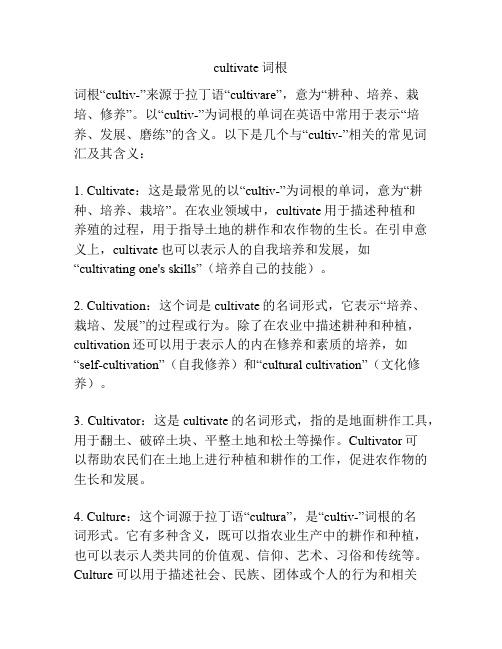
cultivate词根词根“cultiv-”来源于拉丁语“cultivare”,意为“耕种、培养、栽培、修养”。
以“cultiv-”为词根的单词在英语中常用于表示“培养、发展、磨练”的含义。
以下是几个与“cultiv-”相关的常见词汇及其含义:1. Cultivate:这是最常见的以“cultiv-”为词根的单词,意为“耕种、培养、栽培”。
在农业领域中,cultivate用于描述种植和养殖的过程,用于指导土地的耕作和农作物的生长。
在引申意义上,cultivate也可以表示人的自我培养和发展,如“cultivating one's skills”(培养自己的技能)。
2. Cultivation:这个词是cultivate的名词形式,它表示“培养、栽培、发展”的过程或行为。
除了在农业中描述耕种和种植,cultivation还可以用于表示人的内在修养和素质的培养,如“self-cultivation”(自我修养)和“cultural cultivation”(文化修养)。
3. Cultivator:这是cultivate的名词形式,指的是地面耕作工具,用于翻土、破碎土块、平整土地和松土等操作。
Cultivator可以帮助农民们在土地上进行种植和耕作的工作,促进农作物的生长和发展。
4. Culture:这个词源于拉丁语“cultura”,是“cultiv-”词根的名词形式。
它有多种含义,既可以指农业生产中的耕作和种植,也可以表示人类共同的价值观、信仰、艺术、习俗和传统等。
Culture可以用于描述社会、民族、团体或个人的行为和相关价值观,以及与之相关的信仰、语言和艺术。
5. Self-cultivation:这个词组由“self”(自我)和“cultivation”(培养)组成,表示个人努力去发展和提高自己的素质、技能和品德。
Self-cultivation是一种追求自我完善和内在提升的行为,可以通过学习、反思、实践和修养来实现。
提升自身素养的英语作文
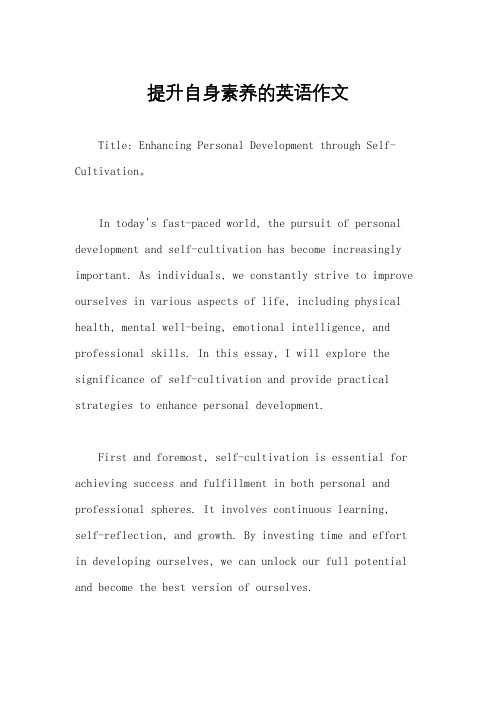
提升自身素养的英语作文Title: Enhancing Personal Development through Self-Cultivation。
In today's fast-paced world, the pursuit of personal development and self-cultivation has become increasingly important. As individuals, we constantly strive to improve ourselves in various aspects of life, including physical health, mental well-being, emotional intelligence, and professional skills. In this essay, I will explore the significance of self-cultivation and provide practical strategies to enhance personal development.First and foremost, self-cultivation is essential for achieving success and fulfillment in both personal and professional spheres. It involves continuous learning,self-reflection, and growth. By investing time and effort in developing ourselves, we can unlock our full potential and become the best version of ourselves.One of the key aspects of self-cultivation is lifelong learning. Learning should not be confined to formal education but should be embraced as a lifelong journey. We can expand our knowledge and skills through various means, such as reading books, attending workshops, taking online courses, and seeking mentorship. By acquiring new knowledge and skills, we not only enhance our personal developmentbut also increase our opportunities for success in theever-evolving global landscape.Furthermore, self-reflection plays a crucial role inself-cultivation. It involves introspection and examination of our thoughts, feelings, and behaviors. Through self-reflection, we gain insights into our strengths, weaknesses, values, and aspirations. We can identify areas for improvement and set meaningful goals to work towards. Journaling, meditation, and regular self-assessment are effective techniques for practicing self-reflection.Moreover, cultivating emotional intelligence isessential for personal development. Emotional intelligence encompasses self-awareness, self-regulation, empathy, andsocial skills. By understanding and managing our emotions effectively, we can build better relationships, make sound decisions, and navigate through life's challenges with resilience. Practicing empathy enables us to connect with others on a deeper level and foster positive interpersonal relationships.In addition to focusing on personal growth, it is important to prioritize physical health and well-being. Regular exercise, balanced nutrition, adequate sleep, and stress management are fundamental for maintaining a healthy lifestyle. A healthy body provides a solid foundation for personal development and enables us to perform at our best in all aspects of life.Furthermore, developing a growth mindset is crucial for self-cultivation. A growth mindset is characterized by a belief in one's ability to learn and grow through effort and perseverance. Instead of viewing challenges as obstacles, individuals with a growth mindset see them as opportunities for growth and development. By cultivating a growth mindset, we can overcome setbacks, embrace feedback,and strive for continuous improvement.In conclusion, self-cultivation is a lifelong journey that requires dedication, self-discipline, and perseverance. By embracing lifelong learning, practicing self-reflection, cultivating emotional intelligence, prioritizing physical health, and adopting a growth mindset, we can enhance our personal development and achieve success and fulfillment in life. Let us commit to investing in ourselves andunleashing our full potential to create a meaningful and fulfilling life journey.。
关于中国智慧的英语作文
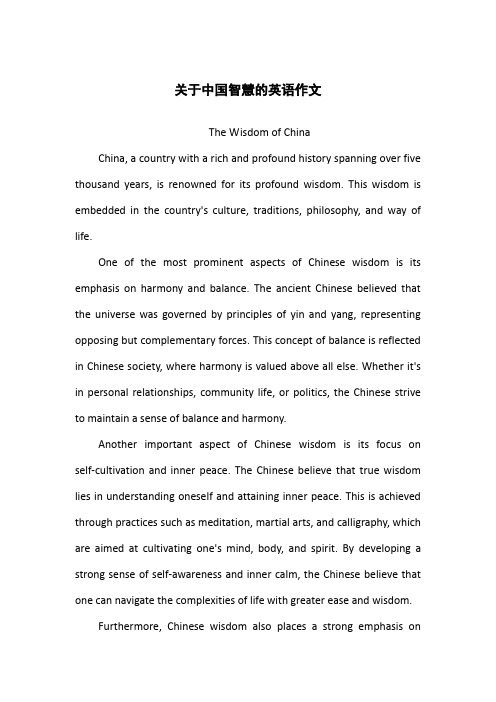
关于中国智慧的英语作文The Wisdom of ChinaChina, a country with a rich and profound history spanning over five thousand years, is renowned for its profound wisdom. This wisdom is embedded in the country's culture, traditions, philosophy, and way of life.One of the most prominent aspects of Chinese wisdom is its emphasis on harmony and balance. The ancient Chinese believed that the universe was governed by principles of yin and yang, representing opposing but complementary forces. This concept of balance is reflected in Chinese society, where harmony is valued above all else. Whether it's in personal relationships, community life, or politics, the Chinese strive to maintain a sense of balance and harmony.Another important aspect of Chinese wisdom is its focus on self-cultivation and inner peace. The Chinese believe that true wisdom lies in understanding oneself and attaining inner peace. This is achieved through practices such as meditation, martial arts, and calligraphy, which are aimed at cultivating one's mind, body, and spirit. By developing a strong sense of self-awareness and inner calm, the Chinese believe that one can navigate the complexities of life with greater ease and wisdom.Furthermore, Chinese wisdom also places a strong emphasis onwisdom through experience. The Chinese believe that wisdom is not merely theoretical but is gained through living and experiencing life. This is evident in the Chinese saying "knowledge is power, but wisdom is better." The Chinese value practical wisdom gained through experience, which they believe is more valuable than theoretical knowledge alone.In conclusion, the wisdom of China is a unique and valuable asset that has been passed down through generations. Its emphasis on harmony, self-cultivation, and wisdom through experience provides a valuable perspective on life that can be applied in various contexts. As we continue to face challenges and complexities in today's world, the wisdom of China offers us a source of inspiration and guidance.。
介绍中国古代名人王阳明英语作文
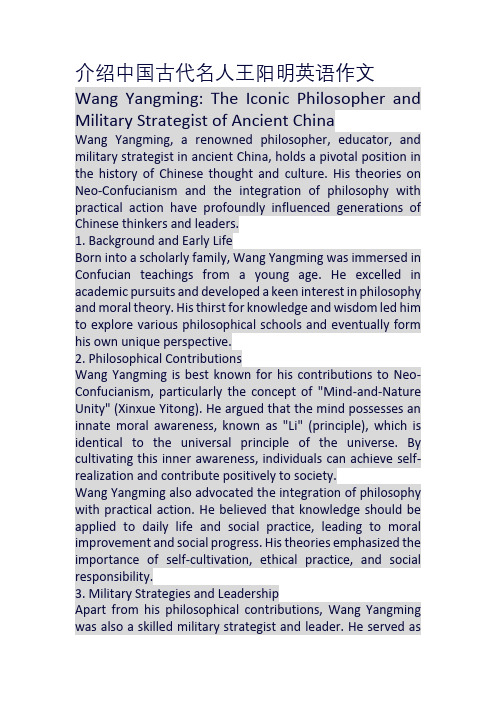
介绍中国古代名人王阳明英语作文Wang Yangming: The Iconic Philosopher and Military Strategist of Ancient ChinaWang Yangming, a renowned philosopher, educator, and military strategist in ancient China, holds a pivotal position in the history of Chinese thought and culture. His theories on Neo-Confucianism and the integration of philosophy with practical action have profoundly influenced generations of Chinese thinkers and leaders.1. Background and Early LifeBorn into a scholarly family, Wang Yangming was immersed in Confucian teachings from a young age. He excelled in academic pursuits and developed a keen interest in philosophy and moral theory. His thirst for knowledge and wisdom led him to explore various philosophical schools and eventually form his own unique perspective.2. Philosophical ContributionsWang Yangming is best known for his contributions to Neo-Confucianism, particularly the concept of "Mind-and-Nature Unity" (Xinxue Yitong). He argued that the mind possesses an innate moral awareness, known as "Li" (principle), which is identical to the universal principle of the universe. By cultivating this inner awareness, individuals can achieve self-realization and contribute positively to society.Wang Yangming also advocated the integration of philosophy with practical action. He believed that knowledge should be applied to daily life and social practice, leading to moral improvement and social progress. His theories emphasized the importance of self-cultivation, ethical practice, and social responsibility.3. Military Strategies and LeadershipApart from his philosophical contributions, Wang Yangming was also a skilled military strategist and leader. He served asan official in the Ming Dynasty and was involved in military campaigns against rebel forces. His military strategies emphasized the importance of morale, discipline, and strategic planning. He believed that a strong army was not just a matter of numbers but also the result of effective leadership and motivation.4. Legacy and InfluenceWang Yangming's theories and ideas have had a profound impact on Chinese thought and culture. His Neo-Confucianism influenced generations of scholars and thinkers, shaping the intellectual landscape of China for centuries. His emphasis on self-cultivation, ethical practice, and social responsibility has also influenced Chinese society and politics. Furthermore, Wang Yangming's ideas have spread beyond China, influencing thinkers and leaders around the world. His theories on morality, leadership, and practical wisdom have resonated with people from different cultures and backgrounds.In conclusion, Wang Yangming stands as an iconic figure in Chinese history, renowned for his philosophical contributions, military strategies, and leadership qualities. His ideas and teachings continue to inspire and guide people in their pursuit of wisdom, morality, and social progress.。
- 1、下载文档前请自行甄别文档内容的完整性,平台不提供额外的编辑、内容补充、找答案等附加服务。
- 2、"仅部分预览"的文档,不可在线预览部分如存在完整性等问题,可反馈申请退款(可完整预览的文档不适用该条件!)。
- 3、如文档侵犯您的权益,请联系客服反馈,我们会尽快为您处理(人工客服工作时间:9:00-18:30)。
On Self-cultivation
There's well-known saying in The book of Changes, "As Heaven's movement is ever vigorous, so must a gentleman ceaselessly strive along." And many strivers, including me, regard it as an inspiring motto because it always encourages us to hold to an ambitious will and nourish a noble spirit. From my point of view, improving oneself through self-cultivation is one of the indispensable merits required to adapt the fast changing information word and fierce competition, one of the keys to achieve success, and one of the accesses to appreciate the beauty of life.
Although we all realize the self-cultivation is necessary and crucial, it cannot get easily. We must cultivate it from daily life with firm perseverance and strong determination, and carry it out throughout our life. Here are two instances to demonstrate this point. Helen Keller, one of the United States top ten heroes idols, has set an outstanding example for us about how to cultivate powerful self-cultivation. Although Helen has been deprived of the right of seeing and hearing at a very young age, with the help of her teacher, finally she graduated from the Harvard University in excellent performances, mastered five languages, completed series of books and established various charity organizations providing benefits for the disabled. At a sudden stroke, Beethoven has lost his hearing at the
peak of his career. But he said, "I will take fate by the throat, it will not bend me completely to its will." Consequently, he made it. These two examples illustrate it clear that persistent self-cultivation is the basis of success. Addition to this, self-cultivation is not only just to improve oneself but it also contributes to society in the form of individual achievements.
In conclusion, what self-cultivation to life is what water to fishes. As a Chinese proverb goes, "A thousand-li journey is started by taking the first step. ", so does the self-cultivation. Self-cultivation benefits individual as well as society.。
